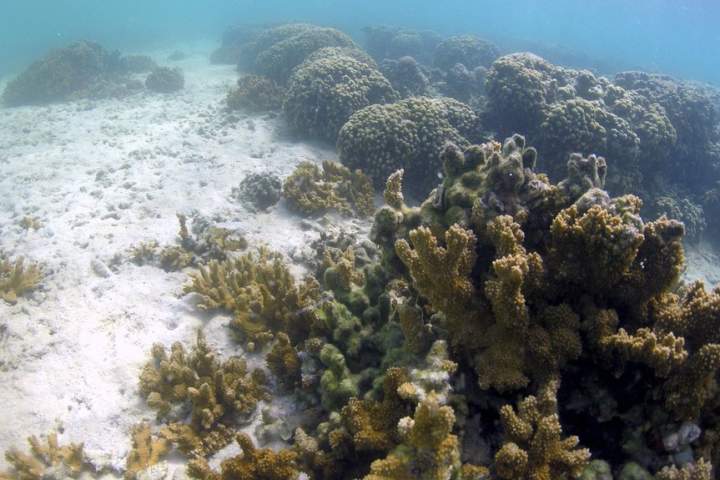Science
Coral Reefs Reach Tipping Point as Global Warming Accelerates

Global coral reefs are facing an almost irreversible die-off, as scientists warn that climate change has reached critical thresholds much sooner than anticipated. This alarming conclusion comes from the Global Tipping Points report, which involved the collaboration of 160 researchers worldwide. They identified what they describe as the first “tipping point” in the climate-driven collapse of ecosystems. This warning arrives just weeks before the COP30 climate summit, set to take place near the Amazon rainforest in Brazil.
The report outlines that the Amazon rainforest, crucial for global biodiversity, is now at heightened risk of collapse if the average global temperature exceeds 1.5 degrees Celsius. This figure has been revised down from previous estimates, reflecting the immediate threats posed by ongoing deforestation. In addition, the report highlights concerns regarding the Atlantic Meridional Overturning Circulation (AMOC), a key ocean current that plays a significant role in regulating climate, particularly in northern Europe.
Tim Lenton, an environmental scientist at the University of Exeter and lead author of the report, expressed urgency regarding the rapid changes occurring within the climate and biosphere. “Change is happening fast now, tragically, in parts of the climate, the biosphere,” he stated.
Despite these dire warnings, Lenton noted some positive developments in the transition towards renewable energy. According to data from the nonprofit think tank Ember, renewables generated more electricity than coal for the first time this year. “Nobody wants to be just traumatized and disempowered,” Lenton emphasized, maintaining that there is still agency to effect change.
The scientists urged nations attending the COP30 summit in November to prioritize reductions in climate-warming carbon emissions. They expressed surprise at the rate of environmental changes, with average global temperatures currently warming by 1.3 to 1.4 degrees Celsius above preindustrial levels, as reported by the United Nations (U.N.) and European Union (EU) science agencies.
The past two years have marked the warmest on record, leading to marine heatwaves that have stressed approximately 84 percent of the world’s coral reefs, resulting in widespread bleaching and mortality. Coral reefs support about a quarter of marine life, and for them to recover, significant global efforts are necessary to reduce temperatures back to just 1 degree Celsius above preindustrial averages.
Pep Canadell, a senior scientist at Australia’s CSIRO Climate Science Centre, remarked, “The new report makes clear that each year there is an increase in the scope and magnitude of the negative impacts of climate change.” Currently, the world is on a trajectory towards approximately 3.1 degrees Celsius of warming by the end of this century, based on existing national policies.
The findings in the Global Tipping Points report underscore the urgent need for coordinated global action to mitigate the effects of climate change and protect vital ecosystems on which countless species—and human lives—depend.
-

 Politics4 weeks ago
Politics4 weeks agoSecwepemc First Nation Seeks Aboriginal Title Over Kamloops Area
-

 World5 months ago
World5 months agoScientists Unearth Ancient Antarctic Ice to Unlock Climate Secrets
-

 Entertainment5 months ago
Entertainment5 months agoTrump and McCormick to Announce $70 Billion Energy Investments
-

 Science5 months ago
Science5 months agoFour Astronauts Return to Earth After International Space Station Mission
-

 Lifestyle5 months ago
Lifestyle5 months agoTransLink Launches Food Truck Program to Boost Revenue in Vancouver
-

 Technology3 months ago
Technology3 months agoApple Notes Enhances Functionality with Markdown Support in macOS 26
-

 Lifestyle3 months ago
Lifestyle3 months agoManitoba’s Burger Champion Shines Again Amid Dining Innovations
-

 Top Stories2 months ago
Top Stories2 months agoUrgent Update: Fatal Crash on Highway 99 Claims Life of Pitt Meadows Man
-

 Politics4 months ago
Politics4 months agoUkrainian Tennis Star Elina Svitolina Faces Death Threats Online
-

 Sports5 months ago
Sports5 months agoSearch Underway for Missing Hunter Amid Hokkaido Bear Emergency
-

 Politics5 months ago
Politics5 months agoCarney Engages First Nations Leaders at Development Law Summit
-

 Technology5 months ago
Technology5 months agoFrosthaven Launches Early Access on July 31, 2025





















